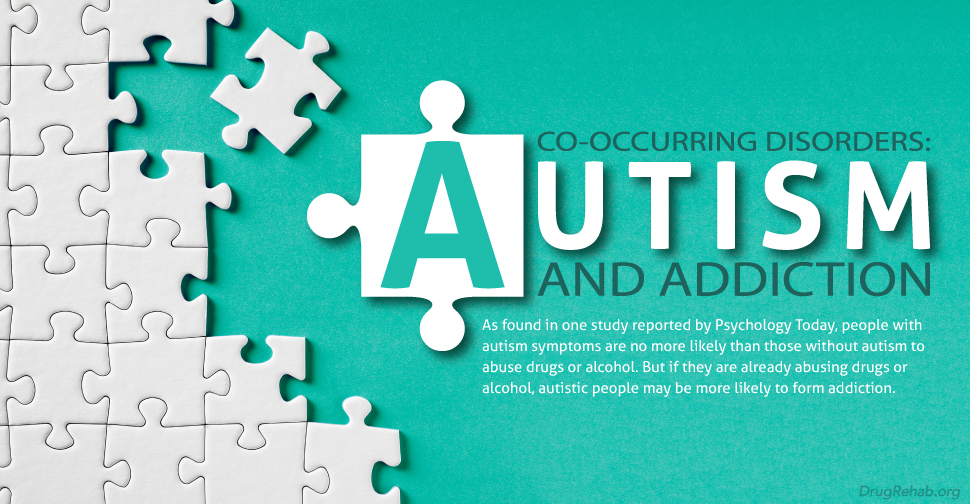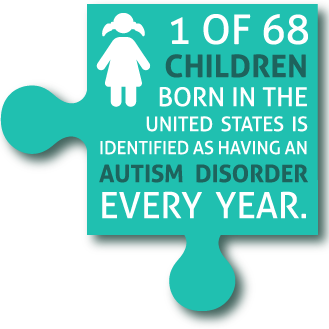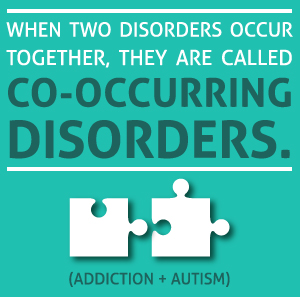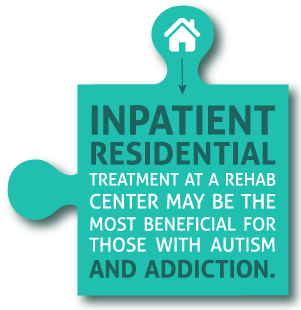
Autism is a disorder which affects three million Americans, and tens of millions worldwide, according to Autism Speaks. With one in 68 children in the U.S. identified as having an autism disorder every year, much research has been focused on finding ways for those with autism to cope. Some of this research has shown that those with autism are more likely to become addicted to substances. As found in one study reported by Psychology Today, people with autism symptoms are no more likely than those without autism to abuse drugs or alcohol. But if they are already abusing drugs or alcohol, autistic people may be more likely to form addiction.
What Is Autism?
Autism is a disease which may be characterized by troubles with social interaction, difficulty with verbal and/or nonverbal communication, and repetitive behaviors. Autism was previously identified by many offshoots of the disorder, each with its own name, but now all autism disorders are known as an autism spectrum disorder (ASD). Each disorder is somewhere on the autism spectrum. Due to the characteristics of ASDs, autism may also be associated with intellectual disabilities, troubles with motor coordination or attention, and physical health issues. Some health issues include issues with sleep and disruption of the gastrointestinal (digestive) system. However, those with ASDs may also see exceptional performance or success in other areas, such as art, math, music, and visual skills.
Who Does Autism Affect?
 Autism is much more common today than it was in past decades. The current number of children affected by autism is a ten-fold increase from forty years ago, according to Psychology Today. Research suggests autism gets its start in early brain development; one of the suggested ways to prevent autism for pregnant mothers is a diet high in folic acid. However, autism may be diagnosed in children two to three years of age—when symptoms tend to become obvious. Autism is also more common in boys than in girls.
Autism is much more common today than it was in past decades. The current number of children affected by autism is a ten-fold increase from forty years ago, according to Psychology Today. Research suggests autism gets its start in early brain development; one of the suggested ways to prevent autism for pregnant mothers is a diet high in folic acid. However, autism may be diagnosed in children two to three years of age—when symptoms tend to become obvious. Autism is also more common in boys than in girls.
How Is Autism Linked To Addiction?
 Autism is not typically associated with alcohol or drug abuse. Psychology Today explains that people with autism are traditionally not drawn to alcohol abuse because they tend to have a “preference for low risk and avoidance of social situations.” But the newest findings point to a heightened risk of addiction for those with autism. When two disorders occur together, they are called co-occurring disorders. People affected by an ASD may fall victim to addiction simply because of the symptoms of their disorder. If a person with autism begins drinking or abusing drugs, he or she will have a high likelihood of repeating that behavior, fostering addiction. Also, autistic tendencies may be a risk factor for developing substance abuse disorders, such as avoidance of social interaction and communication difficulty.
Autism is not typically associated with alcohol or drug abuse. Psychology Today explains that people with autism are traditionally not drawn to alcohol abuse because they tend to have a “preference for low risk and avoidance of social situations.” But the newest findings point to a heightened risk of addiction for those with autism. When two disorders occur together, they are called co-occurring disorders. People affected by an ASD may fall victim to addiction simply because of the symptoms of their disorder. If a person with autism begins drinking or abusing drugs, he or she will have a high likelihood of repeating that behavior, fostering addiction. Also, autistic tendencies may be a risk factor for developing substance abuse disorders, such as avoidance of social interaction and communication difficulty.
How Is Autism Treated?
Treating autism helps lessen the severity of some of the symptoms, which could lessen the likelihood of developing an addiction. Early prevention efforts work to dispel some of the more severe behavioral characteristics. Treatment of autism involves family support, professional interaction, and therapy. As children grow, different levels of treatment may aid for their differing developmental needs. With early prevention, adolescents and adults who have autism may have established a set of treatment methods which work to target their specific symptoms.
Treating Autism And Addiction
 The goal for those with autism is often to move them into a manageable state of the disorder, and some reach this level. For those who don’t, and who develop addiction to drugs or alcohol, treatment is the best help available. Inpatient residential treatment at a rehab center may be the most beneficial for those with autism and addiction. Treatment centers which recognize a person’s co-occurring disorders may provide the best chance for recovery.
The goal for those with autism is often to move them into a manageable state of the disorder, and some reach this level. For those who don’t, and who develop addiction to drugs or alcohol, treatment is the best help available. Inpatient residential treatment at a rehab center may be the most beneficial for those with autism and addiction. Treatment centers which recognize a person’s co-occurring disorders may provide the best chance for recovery.
Treating co-occurring disorders such as autism and addiction requires a comprehensive treatment plan. Treatment approaches must address the symptoms of both disorders, while still attending to the patient’s overall needs. Some methods for treating autism are similar to those for addiction, such as counseling, therapy for the individual, family, or group, and behavioral therapy.
Treatment approaches for co-occurring disorders in the past have often fallen short; usually one disorder is properly diagnosed and treated while the other is left untreated. As Substance Abuse and Mental Health Services Administration (SAMHSA) explains, “the consequences of undiagnosed, untreated, or undertreated co-occurring disorders can lead to a higher likelihood of experiencing homelessness, incarceration, medical illnesses, suicide, or even early death.” With adequate treatment for both sides of a co-occurring disorder, a person can begin to heal.
How To Find Treatment For Co-Occurring Disorders
One out of 42 boys and one in 189 girls are diagnosed with autism every year in the United States. Autistic tendencies may make a person more susceptible to addiction. Treatment is the most effective way to help a person recover from co-occurring disorders, and we at DrugRehab.org have the resources you need to get help for your loved one. To learn more about treatment options and to have your concerns heard, call us today.
Sources
Autism Speaks—How Is Autism Treated?
Autism Speaks—What Is Autism?
Psychology Today—Autistic Symptoms Make Higher Risk For Substance Abuse
Substance Abuse And Mental Health Services Administration—Co-Occuring Disorders
Washington University In St. Louis—People With Autistic Tendencies Vulnerable To Alcohol Problems


